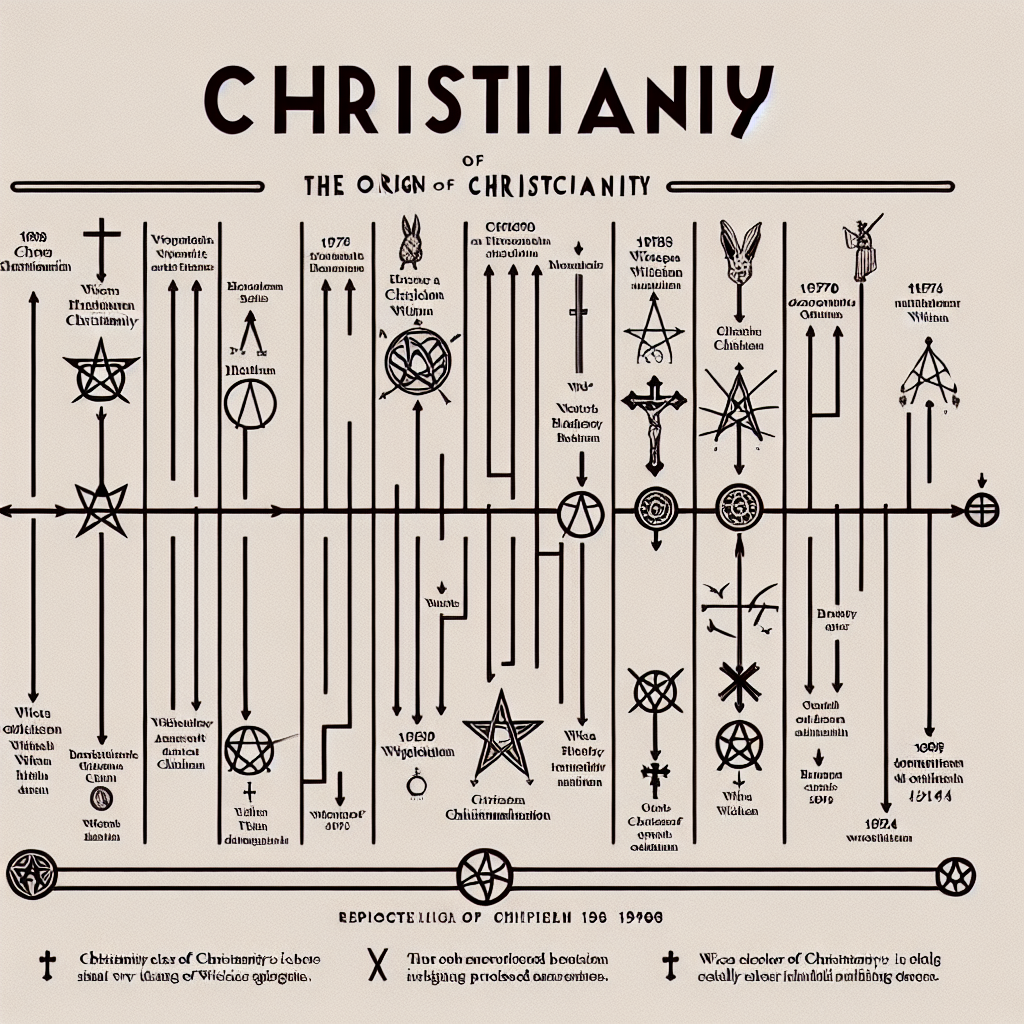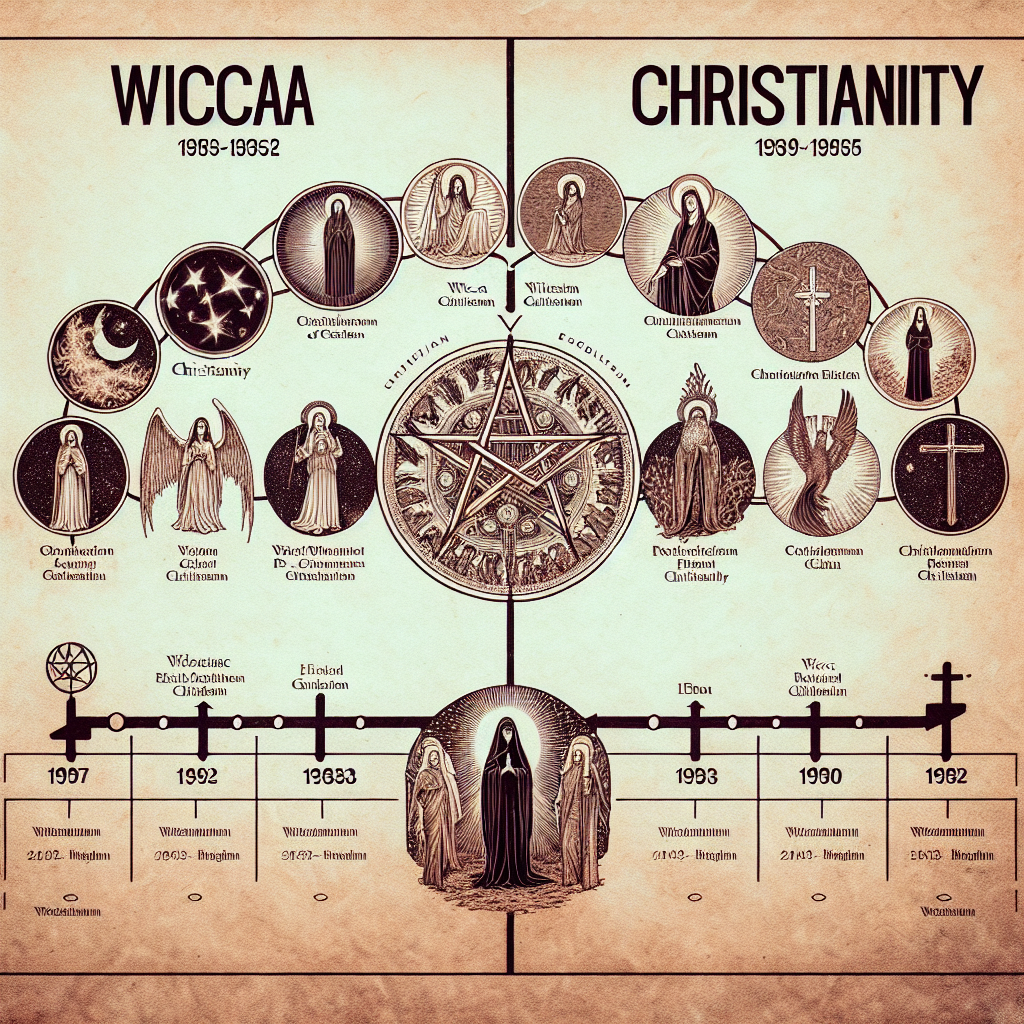As an Amazon Associate I earn from qualifying purchases.

Wicca, often referred to as “the Craft,” is a modern, nature-based pagan religion, which is focused on the worship of the Goddess and the God, and the observance of seasonal festivals known as Sabbats. Although Wicca as a formalized religious movement did not come into public awareness until the mid-20th century, some adherents believe that its practices are a continuation of pre-Christian traditions that were kept alive in secret throughout the centuries.
Christianity, on the other hand, has a clear historical timeline that dates back approximately two thousand years, with its roots in the Jewish faith of antiquity. It began with the life and teachings of Jesus Christ in the 1st century CE in Roman-occupied Palestine. After the death of Jesus, his disciples continued to spread his teachings, and over the next few centuries, Christianity went from being a persecuted minority to the state religion of the Roman Empire.
The story of Wicca as we know it began in the early 20th century with figures such as Gerald Gardner, who is often credited with founding the movement in the 1940s and 1950s. Gardner claimed that Wicca was a modern interpretation of ancient witchcraft traditions that had survived in secret after being driven underground by the spread of Christianity and other monotheistic religions. However, historical evidence for these claims is scarce, and much of Wicca’s beliefs and practices as outlined by Gardner and his contemporaries have been shown to be inspired by earlier 19th and 20th-century sources such as Freemasonry, ceremonial magic, and the romanticized lore of writers such as Margaret Murray.
In terms of followers, Christianity is one of the world’s largest religions, with billions of adherents globally. Its influence has shaped cultures, laws, art, and philosophy for centuries. Wicca, while nowhere near as widespread as Christianity, has grown in popularity, particularly in Western countries, and is often highlighted for its focus on environmentalism, equality, and personal spirituality.
A compelling aspect of Wicca that has contributed to its modern appeal is its adaptability and the degree to which practitioners may tailor rituals and beliefs to their personal needs and local customs. This characteristic stands in contrast to the more rigid doctrines and centralized structures characteristic of several large Christian denominations. With its emphasis on the divine feminine, Wicca has also found resonance in movements for gender equality and the reassessment of traditional gender roles.
“`html
Is Wicca an Older Religion Than Christianity? Exploring Historical Origins
“`
Wicca, a modern pagan worship practice, often evokes images of ancient rites and pre-Christian spirituality. However, contrary to popular belief, Wicca is a relatively new religious movement that originated in the mid-20th century, drawing from older pagan traditions, mythology, and ceremonial magic. Christianity, in contrast, has roots that reach back nearly two millennia, with the life of Jesus Christ and ensuing apostolic teachings forming its historical foundation. Thus, while Wicca may embrace elements that are reminiscent of pre-Christian religion and folklore, it is not older than Christianity. This article will delve deeper into the precise timelines and evolution of both faiths, examining their historical contexts, core beliefs, and the interplay of ancient traditions within modern Wiccan practices.
Wicca as a distinct religious movement did not exist until the mid-20th century, which puts it much later on the timeline than Christianity. However, Wicca draws inspiration from pre-Christian pagan religions and practices that did exist before Christianity. The roots of Wicca can be traced back to the early 20th century, but it was only officially founded in the 1950s by Gerald Gardner.
Christianity, on the other hand, has a much clearer start date with the life of Jesus Christ and the subsequent spread of his teachings by his disciples, which is chronicled in the New Testament of the Bible. The traditional date for the founding of Christianity is in the 1st century AD, with Jesus’ ministry commonly accepted to have begun around AD 30-33 and his crucifixion estimated to have occurred around AD 33-36. The Christian church began to form in earnest after this point, with the first Council of Nicaea being held in AD 325, which set out some foundational aspects of Christian doctrine.
In contrast, Wicca’s origins as developed by Gardner are a product of modern times but are based on earlier witchcraft traditions, folklore, ritual magick, and the works of individuals like Aleister Crowley, as well as the broader context of the Western esoteric tradition. These sources, in turn, may draw from much older beliefs, but as a cohesive system of belief and practice, Wicca is not “older” than Christianity.
One can argue that some of the individual elements within Wiccan practice—like seasonal celebrations and reverence for nature—are indeed older than Christianity and can be found in various forms across pre-Christian, pagan societies across Europe. Festivals like Samhain and Beltane, for instance, have ancient Celtic roots, and the veneration of natural phenomena can be traced to numerous indigenous belief systems from around the world. Nevertheless, Wicca as a synthesized religion is not more ancient than Christianity; it is a contemporary amalgamation of various old and new beliefs and practices.
In terms of statistics, it is challenging to determine the exact number of Wiccans worldwide due to the decentralized nature of the religion and the variance in practices and beliefs among those identifying as Wiccans. However, estimates suggest that there are hundreds of thousands of Wiccans globally, with the largest populations found in the United States, United Kingdom, and Australia. Christianity, with its established history, boasts approximately 2.3 billion adherents according to a Pew Research Center report from 2021, making it one of the largest religions in the world.
Q1: What is Wicca and how does it differ from Christianity?
A1: Wicca is a modern Pagan religious movement that emphasizes the worship of nature, and typically includes the practice of magic. It often involves a pantheistic or duotheistic belief system, honoring a God and Goddess. Christianity, on the other hand, is an Abrahamic monotheistic religion based on the life and teachings of Jesus Christ.
Q2: Is Wicca older than Christianity?
A2: No, Wicca is not older than Christianity. Wicca was developed in the mid-20th century, while Christianity was established in the 1st century AD.
Q3: When was Wicca first practiced?
A3: Wicca was first practiced in the 1940s and 1950s. It is a relatively new religion compared to many other world religions.
Q4: Who is considered the founder of Wicca?
A4: Gerald Gardner is often credited as the founder of Wicca. He introduced the modern form of the religion in the 1940s and 1950s.
Q5: What kind of historical evidence supports the origins of Wicca?
A5: The origins of Wicca are primarily documented through the writings and recorded practices of Gerald Gardner and his contemporaries. There aren’t ancient texts or artifacts directly linked to Wicca as it is a modern movement.
Q6: Does Wicca draw on ancient pagan practices?
A6: Yes, Wicca is inspired by pre-Christian pagan beliefs and practices, but it is a reconstructionist tradition that interprets and sometimes modifies these elements for modern use.
Q7: How did Christianity emerge, and when did it become a dominant religion?
A7: Christianity emerged from Judaism in the 1st century AD, with the teachings of Jesus Christ and his apostles. It became a dominant religion in the Roman Empire after Emperor Constantine’s conversion to Christianity in the 4th century AD.
Q8: Are there any similarities between Wicca and early Christian practices?
A8: While Wicca and Christianity are distinct religions with different theologies and rituals, some observers have noted superficial similarities in their use of ritual, the celebration of seasonal festivals, and themes of rebirth and renewal.
Q19856 Are Christians and Wiccans able to practice their religions freely today?
A9: Yes, in most countries, individuals are free to practice Christianity, Wicca, or any other religion. However, the level of societal acceptance and legal protections can vary widely depending on the country’s laws and cultural attitudes.
Q10: If Wicca isn’t older than Christianity, why do some people think it is?
A10: The misconception that Wicca is older than Christianity may stem from its roots in ancient pagan practices and the romanticized notion that it represents a direct continuation of pre-Christian European religions.
Historical Timeline: Is Wicca Older than Christianity?
The analysis of the historical timeline reveals that Wicca, as a formalized religion, is not older than Christianity. Christianity has roots that extend back nearly two millennia, emerging in the 1st century CE with the life and teachings of Jesus Christ and the subsequent spread of his message by his disciples. The codification of Christian doctrine and the establishment of the Christian Church took place over several centuries, solidifying Christianity’s foundational place in history long before the inception of Wicca as a modern movement.
Wicca, by contrast, is a relatively new religious movement that was developed in the early-to-mid 20th century by figures such as Gerald Gardner. It draws upon a synthesis of older folk traditions, mythological interpretations, and occult practices, but it was not formally established until several decades into the 20th century. While Wiccans often claim spiritual lineage from ancient pagan practices, the direct continuity is not historically substantiated as a structured religious framework comparable to that of early Christianity. Therefore, while Wicca evokes the imagery and principles of pre-Christian pagan beliefs, it is, in its structured form, a contemporary adaptation, much younger than the long-standing, historical presence of Christianity.
Amazon and the Amazon logo are trademarks of Amazon.com, Inc, or its affiliates.


